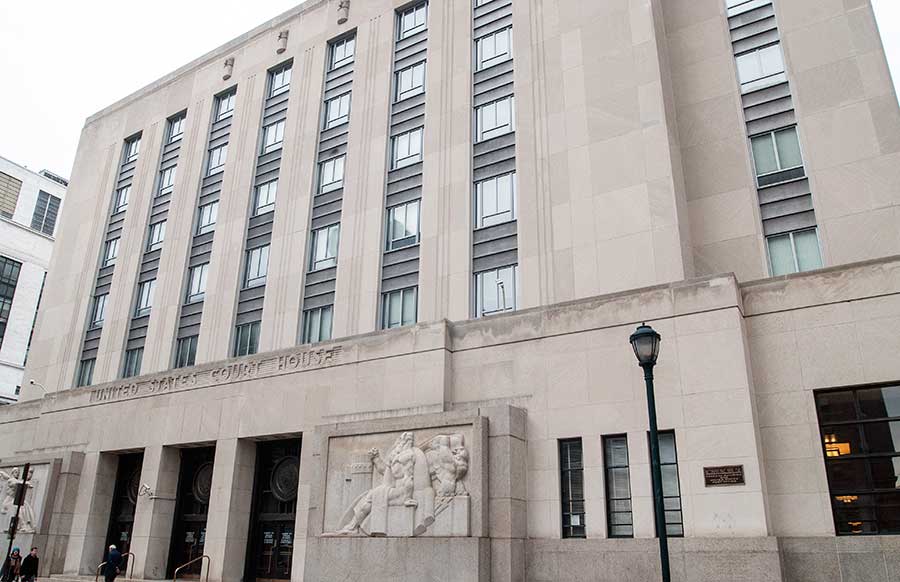
The United States Court House in Philadelphia, Pennsylvania, where the Immigration Court for the city sits. Creative Commons Attribution-NonCommercial 4.0 International License
I-130, I-210, I-212, I-213, I-589, I-601, I-751, a 245 with a 24H waiver, a 42B.
“We do everything by numbers,” Judge Rosalind K Malloy explains to a immigrant without a lawyer and how she needs her “alien number” at all times.
In Judge Malloy’s courtroom #2 of the Philadelphia Immigration Court, individual hearing slots are as far away as 2016 as files of paperwork two, three, four or more inches thick travel by mail trolley back and forth from the US government and the small rooms.
One of Judge Malloy’s colleagues, Judge Miriam K Mills, is off ill for the month of February adding to further delays and a backlog of thousands of cases in Philadelphia, a fraction of the nation’s 400,000 “aliens”.
Natally Natisha Harry-Lovelace, the only one of the “pro says” to turn up in the Robert Nix Federal Building Courthouse on February 10, 2015, meaning she has no lawyer, is patiently told to take a white form, a green and a blue from the table.
She is from Saint Vincent and the Grenadines, where the language is English, but the government forms state her language is “unknown”.
“I don’t believe this,” states Judge Malloy.1
The veteran immigration judge says the white form lists recognised immigration lawyers, firms and agencies, the green is to give the attorney when selected, and the blue is the all-important change-of-address form.
“If you hire a lawyer from out of state,” continues Judge Malloy, “which a lot of people do, just know you will have to pay their transportation fees, you pay for their hotel, for their meals.
“I would urge you to get a local attorney but you can hire anyone you want.
“Whenever you move, even if you stay in the same building and change your apartment, you use that form to do it.
“Do you know what it means by your alien number? Every document you receive from the court will have your name and your A-number.
[Tweet “”Do you know what it means by your alien number?””]”I have gone through this so quickly. Have I missed something? I’m going to continue your case in order for you to find a lawyer. I will put this on for July 28, 2015. Do everything possible to get an attorney by that time.
“The US government says you are here illegally and should be removed. A lot of people don’t understand that. There are applications that will allow you to stay in the United States.
“If you don’t come here on that date, I can order you removed on that date.”
Judge Malloy also adds a warning to Ms Harry-Lovelace to avoid individuals who pretend to be immigration lawyers because “their clients end up in a lot of trouble”.
Justice’s delays
A “victim” of another lawyer is luckier later that brisk Tuesday morning.
Silvestros Jonaitis, originally from Lithuania, was one of those helped by David Lynn, who made millions as head of an asylum fraud conspiracy and was jailed for just 40 months.2
Mr Jonaitis’s case has been going since 2004 and gets delayed twice just on February 10 when first the client is missing, then the lawyer has to go to another court building, then returns but wants to speak to a different government representative, Charles Ireland.
“This is a case where a 589 clearly involved fraud,” says Mr Ireland, adding that there is a question of whether Mr Jonaitis was a “victim or complicit”.
The man has two children in the US, has not been arrested since he entered, pays his taxes.
But there is “no way he could not have know what was going on, speaking English, having worked on a cruise ship”.
“If you choose to grant that waiver, I would not appeal your decision in that regard,” he says.
Judge Malloy says: “I agree with the government. I believe everyone working with David knew what was going on.
“I believe the equities outweigh the behaviour so it [the case] ends today.
“I don’t buy that people didn’t know.”
The I-212 waiver was granted.3
Language barriers and ‘Good luck’
Philadelphia, though it was then the fourth largest US city, only got its own immigration court in 1996 and judges traveled to Pittsburg, but not in the winter months.
Now the court’s four judges – or three currently – can have slow days or one January session with 104 juveniles in front of Judge Steven A Morley. Each judge has a “master calendar” on a different day of the week. It is effectively the arraignments where cases can be concluded or kicked into the long borders grass to accommodate missing paperwork, or simply missing “aliens”, or a lawyer who slipped outside the building and was badly injured.
At the end of the morning on February 10, Judge Malloy deals with the in absentias. One has seen his notice to appear returned for the second time as the wrong address. The court can issue an in absentia order but Judge Malloy points out that without a proper address, “I can send 100 in absentia orders but they will just come back to the court”.
Bill Lore, for the government, offers to do a bit of investigation using the individual’s social security number and other details in the case file in hopes of finding a correct address to be able to serve a notice to turn up and then take the case forward.
The next case does have a change of address form – for Mongolia. The woman has moved to the capital, Ulan Bator, and Judge Malloy recommends an “admin close” but because of a detail involving the woman’s husband seeking protection from her, the woman is instead ordered “removed from the United States”.
One man has volunteered to return home.
Alberto Tellez-Beristain, through his lawyer, says he will go back to Mexico and Judge Malloy warns him, repeatedly, that this is final. He is sent away to consult with his lawyer and returns later in the morning.
“I will give you the maximum amount of time that the law allows, that’s 120 days, which means you must leave the US on or before June 10, 2015,” she instructs Mr Tellez-Beristain.
“If you do not leave, this voluntary departure order will automatically convert to a removal order.
“For 10 years, you would not be able to receive certain immigration benefits and those benefits include cancellation of removal, adjustment of status, voluntary departure or any other form of relief. You would also be subject to paying fines of up to $5000. You are willing to leave on or before June 10?”
Mr Tellez-Beristain confirms he understands.
[Tweet “”If you do not leave, this voluntary departure order will automatically convert to a removal order.””]Judge Malloy continues: “I’m uncomfortable doing this without the government having a file. Are you aware someone paid $11,000 to have you release from York? [detention facility]”
Mr Lore, who is normally based at York, says he will accept the representations of Mr Tellez-Beristain’s lawyer. His client confirms he has a valid passport and will be able to purchase his own departure ticket. He has one DUI from his time in the US.
But the procedure doesn’t end there. Judge Malloy has written “I-210″ at the bottom of a form for Mr Tellez-Beristain.
“This is the name of a form that you must take with you to Mexico,” she explains through an interpreter. “Before you leave the United States, you must report to the building with your passport, a bus or airline ticket and this order.
“Make sure they give you this form [I-210]. This form has two important purposes. When you take it with you to Mexico, you will hand it over to an American embassy or consulate, whichever is closer. It’s very important that you turn this over to an embassy or consulate. This will prove you have obeyed the voluntary departure order. You must appear in person and produce the form.
“They will also notify the Department of Treasury and then the officials there will return the $11,000 to the person who posted it for you.
“You understand everything?
“These proceedings are concluded. Good luck to you.”
CORE PRINCIPLES APPLIED
No relevant issues on principles 2, 3, 4, 6, 9 or 10.
1. Freedom of expression: Open courts can be openly reported in the absence of specific orders on particular cases. There were no such orders in these cases and so Tomorrow asserts its freedom to report the proceedings.
5. Comfort the afflicted and afflict the complacent: In this case, the complacent are the public and media who do not normally observe many courts, particularly those relating to immigration. While many going through such systems may have been afflicted in their original home countries, those details were not part of these court proceedings and coverage of the proceedings should be according to the principle of open justice (#7) first.
7. Justice must be seen to be done: Most members of the public never attend court hearings as observers. While reporters can, in practice, represent the public, they also may rarely attend certain types of courts or cases. Statistics about the courts offer little information about the mechanisms of these courts and so open justice requires at least periodic observation by outsiders.
8. Be a safe harbour for the public and staff: Similar to #5, no details were led of potential risk to those individuals going through the immigration court system on this date. Court reporting must maintain a certain distance from what consequences of reporting might exist in the future, to ensure that justice is seen to be done.
11. Promote responsible debate and mediation: How do you think the immigration court system works? Have you ever attended a hearing as an observer or as an immigrant yourself? How should the media best ensure scrutiny of the system?
- Reports on the Philadelphia judges can be found through the TRAC project at http://trac.syr.edu/immigration/reports/judgereports/ ↩
- http://www.fbi.gov/philadelphia/press-releases/2010/ph061010.htm ↩
- A list of many of the forms can be found at http://www.uscis.gov/forms with the I-210 at http://photos.state.gov/libraries/jamaica/231771/PDFs/ice_form_i_210.pdf ↩


